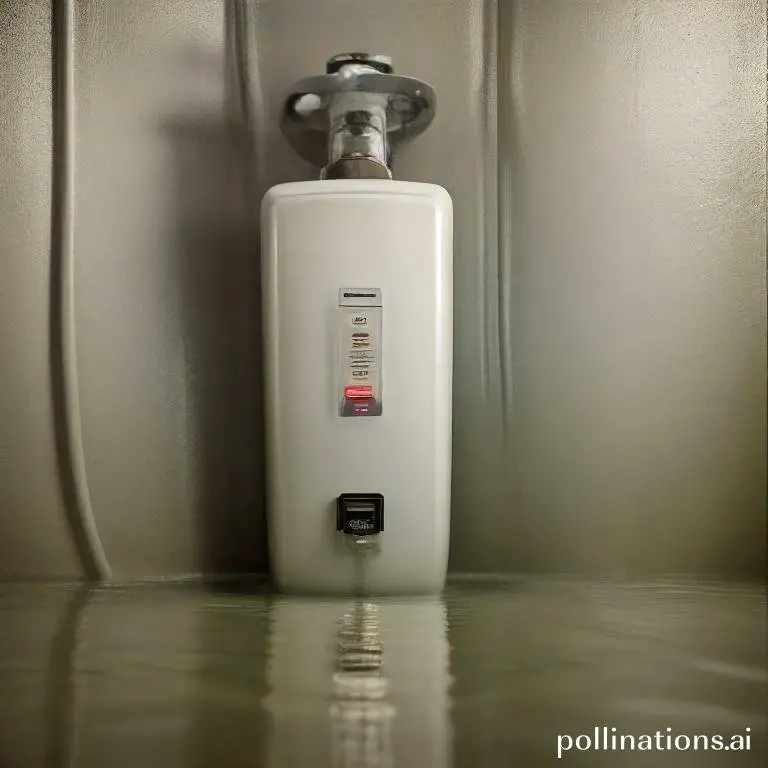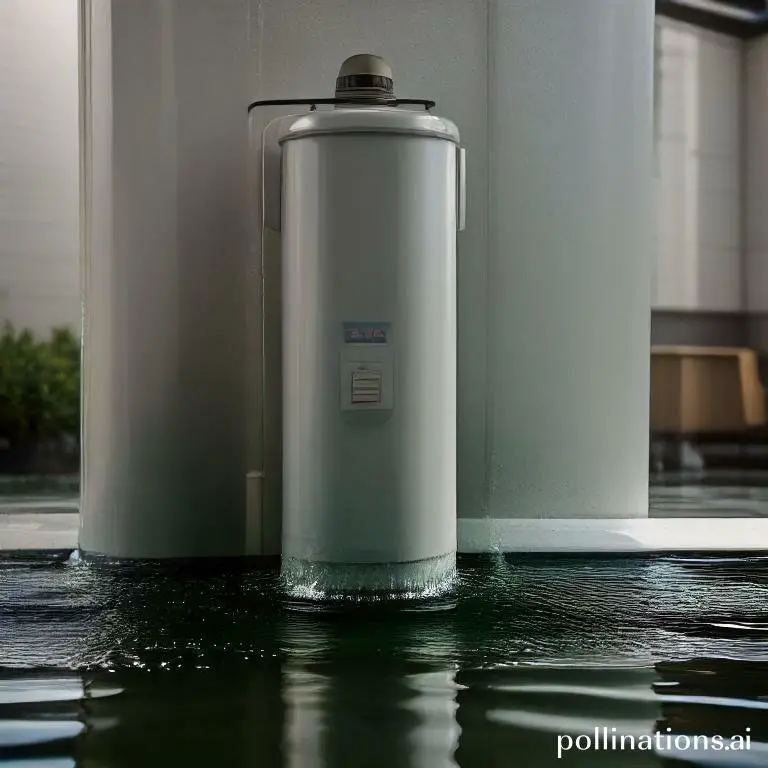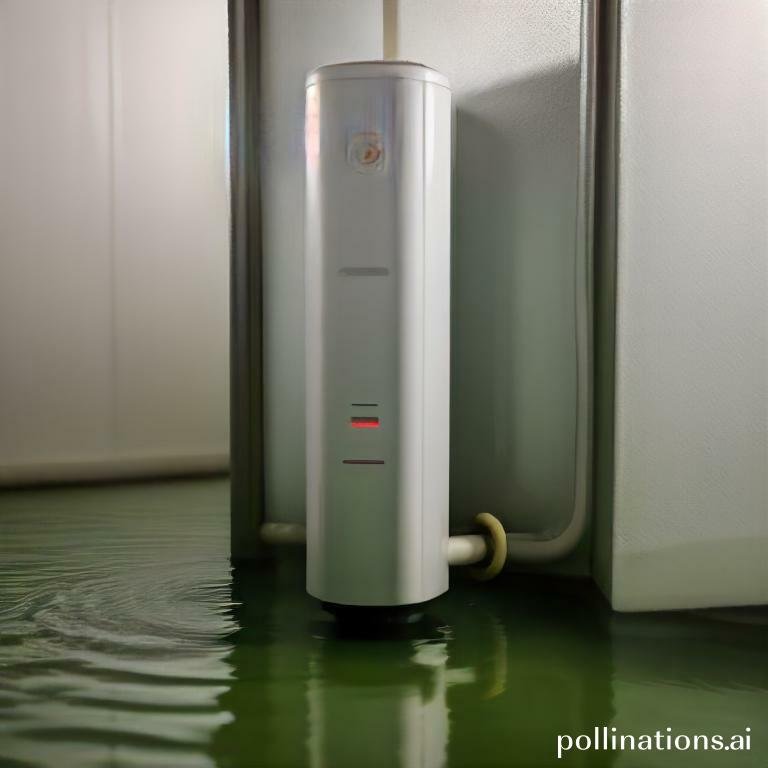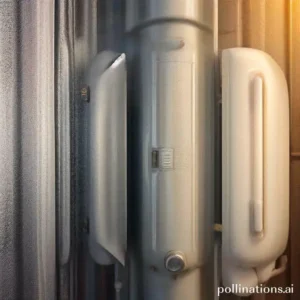
II. Identifying and repairing leaks in a timely manner can help reduce energy waste and save money in the long run.
III. Regular maintenance and inspection of water heaters can help prevent leaks and ensure efficient operation, further reducing energy consumption and costs.
Leaks in water heaters can have a significant impact on energy consumption. These leaks not only waste water, but they also cause the water heater to work harder and use more energy to maintain the desired temperature.
Identifying and fixing leaks in a timely manner can help save both water and energy, resulting in lower utility bills and a more environmentally friendly home. By comprehending the potential impact of leaks on water heater energy consumption, homeowners can take proactive steps to ensure their systems are functioning efficiently and effectively.
Signs of Leaks in Water Heaters
Water heaters are an essential part of any household, providing hot water for various activities. Despite this, over time, these appliances may develop leaks that can lead to significant damage if left unnoticed. It’s crucial to be aware of the signs that indicate a leak in your water heater, allowing you to address the issue promptly and prevent further complications.
1. Decreased hot water availability
If you notice a sudden decrease in the amount of hot water available, it could be a sign of a leak in your water heater. Leaks can cause water to escape before it reaches your faucets or showers, resulting in insufficient hot water for your daily needs. It’s important to investigate this issue further to determine the source of the leak.
2. Visible water pooling around the water heater
Another telltale sign of a leak in your water heater is the presence of visible water pooling around the appliance. If you notice water accumulating near the base of the water heater or surrounding pipes, it’s likely that a leak is occurring. Ignoring this sign can lead to water damage and potential mold growth, so it’s crucial to take immediate action.
3. Strange noises coming from the water heater
Leaking water heaters often produce strange noises that indicate a problem. If you hear hissing, popping, or gurgling sounds coming from your water heater, it could be a result of water leakage. These noises occur as water escapes through cracks or damaged components within the appliance. Consulting a professional plumber is advisable to address this issue effectively.
4. Increase in water bills
A sudden and unexplained increase in your water bills could be a sign of a leak in your water heater. Leaks lead to wasted water, causing your consumption to rise and resulting in higher bills. If you notice a significant change in your water expenses without any apparent reason, it’s essential to inspect your water heater for potential leaks.
5. Unpleasant odors in the water
Leaking water heaters can sometimes produce unpleasant odors in the water supply. If you notice a foul smell when using hot water, it could indicate a leak and potential contamination of the water. This issue should be addressed promptly to prevent any health risks associated with contaminated water.
| Signs of Leaks in Water Heaters |
|---|
| 1. Decreased hot water availability |
| 2. Visible water pooling around the water heater |
| 3. Strange noises coming from the water heater |
| 4. Increase in water bills |
| 5. Unpleasant odors in the water |
Being aware of these signs can help you detect and address leaks in your water heater before they cause significant damage. If you notice any of these indications, it’s advisable to consult a professional plumber who can assess the issue and provide appropriate solutions. Remember, early detection and timely repairs can save you from costly repairs and ensure the uninterrupted availability of hot water in your home.
Causes of Leaks in Water Heaters
Water heaters are essential appliances that provide hot water for various purposes. In contrast, they can sometimes develop leaks, leading to water damage and potential safety hazards. Absorbing the causes of these leaks can help you prevent them and ensure the longevity of your water heater.
1. Corrosion
Corrosion is one of the primary causes of leaks in water heaters. Over time, the metal components of the heater can corrode due to exposure to water and minerals. This corrosion weakens the integrity of the tank, leading to leaks. Regular maintenance, such as flushing the tank and checking for signs of rust, can help prevent corrosion-related leaks.
2. High Water Pressure
Excessive water pressure can put strain on the water heater, causing leaks. When the pressure inside the tank exceeds the recommended levels, it can lead to weakened connections and damage to the tank. Installing a pressure regulator or reducing the overall water pressure in your home can help prevent leaks caused by high water pressure.
3. Sediment Buildup
Over time, sediment and minerals can accumulate at the bottom of the water heater tank. This buildup can create a barrier between the heating element and the water, causing the heater to overheat and develop leaks. Regularly flushing the tank to remove sediment can help prevent these types of leaks.
4. Loose Connections
Leaks can also occur due to loose connections in the water heater. These connections, such as pipes or valves, can become loose over time, leading to water seepage. Ensuring that all connections are properly tightened during installation and periodically checking for any signs of leakage can help prevent this issue.
5. Old Age of the Water Heater
Water heaters have a limited lifespan, and as they age, they become more prone to leaks. The constant heating and cooling of the water can cause wear and tear on the tank, leading to cracks and leaks. If your water heater is nearing the end of its expected lifespan, it may be time to consider replacing it to avoid potential leaks and water damage.
Consequences of Ignoring Leaks in Water Heaters
As for water heaters, leaks should never be ignored. These seemingly small issues can have significant consequences if left unaddressed. Let’s ponder the potential outcomes of ignoring leaks in water heaters.
1. Decreased energy efficiency
A leak in a water heater can lead to decreased energy efficiency. As the water leaks out, the heater needs to work harder to maintain the desired temperature. This extra strain on the system can result in higher energy consumption and increased utility bills.
2. Damage to the water heater
Ignoring leaks can cause damage to the water heater itself. The constant exposure to water can corrode the internal components, leading to malfunctions and potential breakdowns. Repairing or replacing a damaged water heater can be costly and inconvenient.
3. Increased risk of water damage to the surrounding area
Leaking water from a water heater can seep into the surrounding area, causing water damage to walls, floors, and other structures. This can lead to costly repairs and restoration work. Additionally, prolonged exposure to moisture can create an environment conducive to mold and mildew growth.
4. Higher repair costs
If leaks are left unattended, the damage to the water heater and surrounding area can worsen over time. This can result in higher repair costs when the issue is finally addressed. Promptly fixing leaks can help minimize repair expenses and prevent further damage.
5. Health risks associated with mold and mildew growth
One of the most concerning consequences of ignoring leaks in water heaters is the potential health risks associated with mold and mildew growth. These fungi thrive in moist environments and can release spores that can cause respiratory issues, allergies, and other health problems. It is crucial to address leaks promptly to prevent mold and mildew from taking hold.

How to Detect Leaks in Water Heaters
Water heaters are an essential part of any household, providing hot water for bathing, cleaning, and other daily tasks. In contrast, over time, these appliances may develop leaks, leading to water wastage and potential damage to your property. It is crucial to detect these leaks early on to prevent further issues. Here are five effective methods to detect leaks in water heaters:
1. Visual Inspection
Start by visually inspecting your water heater for any visible signs of leaks. Look for water puddles or damp areas around the appliance, particularly near the connections, valves, and pipes. Additionally, check for any corrosion or rust spots, as these can indicate potential leaks.
2. Pressure Testing
Performing a pressure test can help identify leaks in your water heater. Begin by turning off the power supply and closing the water supply valve. Connect a pressure gauge to the drain valve and open it slightly. If the pressure reading drops over time, it suggests a leak in the tank or pipes.
3. Temperature Testing
Another way to detect leaks is by monitoring the temperature of the water heater. If the water temperature fluctuates significantly or fails to reach the desired level, it could be a sign of a leak. This occurs when hot water escapes through a crack or hole in the tank or pipes.
4. Dye Testing
Dye testing involves adding colored dye to the water in the tank. If there is a leak, the dye will seep out and become visible in the surrounding area. This method is particularly useful for detecting small leaks or cracks that may not be easily noticeable during a visual inspection.
5. Electronic Leak Detection
For more precise leak detection, consider using electronic leak detection devices. These devices use advanced technology to identify leaks by detecting changes in moisture levels or temperature gradients. They can help pinpoint the exact location of the leak, minimizing the need for extensive repairs.
| Leak Detection Methods |
|---|
| Visual inspection |
| Pressure testing |
| Temperature testing |
| Dye testing |
| Electronic leak detection |

How to Fix Leaks in Water Heaters
Water heaters are essential appliances in any home, providing hot water for various household tasks. Notwithstanding, leaks can occur over time, causing inconvenience and potential damage. If you notice a leak in your water heater, it’s important to take immediate action to prevent further issues. Here are some steps you can take to fix leaks in water heaters:
1. Tightening loose connections
One common cause of leaks in water heaters is loose connections. Start by inspecting all the connections, including the inlet and outlet pipes, as well as the pressure relief valve. Use a wrench to tighten any loose fittings, ensuring a secure connection. This simple step can often resolve minor leaks.
2. Flushing out sediment buildup
Over time, sediment can build up inside the water heater tank, leading to leaks. To address this issue, you can flush out the tank to remove the sediment. Turn off the power supply or gas valve to the water heater and connect a hose to the drain valve. Open the valve and let the water flow out, carrying away the sediment. Once the water runs clear, close the valve and refill the tank.
3. Replacing damaged parts
If tightening the connections or flushing out the sediment doesn’t solve the leak problem, it may be necessary to replace damaged parts. Commonly affected components include the temperature and pressure relief valve, the drain valve, or the heating element. Consult the manufacturer’s instructions or seek professional help to ensure proper replacement.
4. Repairing or replacing corroded pipes
In some cases, leaks may be caused by corroded pipes connected to the water heater. Inspect the pipes for signs of corrosion or damage. If the pipes are only partially corroded, you may be able to repair them by cutting out the damaged section and installing a replacement. That being said, if the corrosion is extensive, it’s best to replace the entire pipe to prevent future leaks.
5. Replacing the entire water heater if necessary
In rare cases, the leak may be due to severe damage or deterioration of the water heater itself. If the unit is old, inefficient, or beyond repair, it may be time to consider replacing the entire water heater. Consult with a professional to determine the best course of action based on the specific circumstances.
| Step | Action |
|---|---|
| 1 | Tighten loose connections |
| 2 | Flush out sediment buildup |
| 3 | Replace damaged parts |
| 4 | Repair or replace corroded pipes |
| 5 | Replace entire water heater if necessary |
Bottom Line
Leaks in water heaters can have a significant impact on energy consumption, leading to higher utility bills and reduced efficiency. Regular maintenance and prompt repairs can help prevent leaks and ensure optimal performance of your water heater. Vital to monitor your water heater for signs of leaks, such as puddles or dampness around the unit, and address any issues promptly. Additionally, upgrading to a newer, more energy-efficient water heater can help reduce energy consumption and save you money in the long run. By taking proactive steps to prevent leaks and optimize your water heater’s performance, you can enjoy reliable hot water and lower energy costs.
Remember, leaks are not only a nuisance but also a potential hazard. If you suspect a gas leak, turn off the gas supply immediately and contact a professional for assistance. Don’t let leaks go unchecked – take action to protect your home and your wallet.
Read More:
1. Water Heater Leaks And Home Safety Considerations
2. Leaks And Their Impact On Water Heater Technology
















